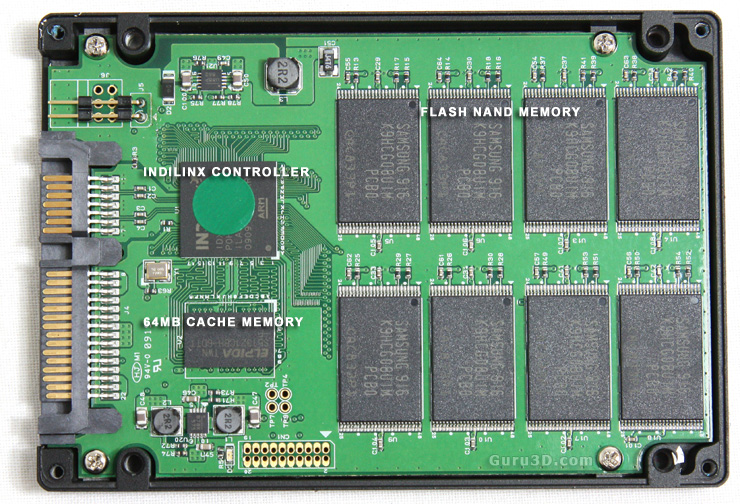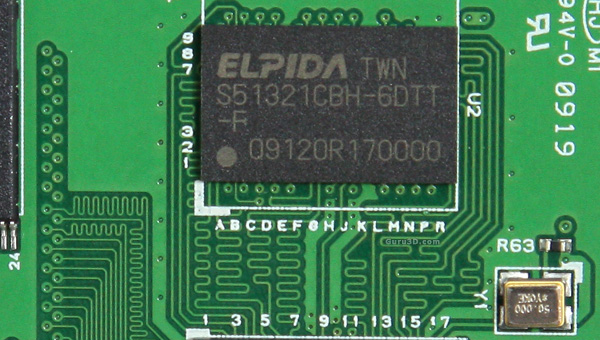Meet the Monster
Corsair X Series SATA II 2.5" SSD - 128GB
So roughly three maybe four weeks ago Corsair added three new products in its X enthusiast (Extreme) performance Series SSD family: the X32, X64 and X128, high-performance solid-state drives.
Check out the features
- Maximum sequential read speed up to 240MB/s
- Maximum sequential write speed up to 170MB/s
- Indilinx Barefoot controller and Samsung MLC NAND flash for maximum performance
- 64MB DRAM cache for stutter-free performance
- No moving parts for increased durability over standard hard disk drives
- Decreased power usage for cool and quiet operation and increased laptop battery life
- 100+ Year Life Expectancy (MTBF)
- User upgradeable firmware
- Two year warranty
But let's startup some of the more important aspects and features of the drive. As there definitely are some things you guys needs to be aware of. First off, the three models within the X series and have different performance numbers per drive.
| 32GB Max Performance (CMFSSD-32D1) |
| Read: Up to 220 MB/s |
| Write: Up to 135 MB/s |
| 64GB Max Performance (CMFSSD-64D1) |
| Read: Up to 220 MB/s |
| Write: Up to 135 MB/s |
128GB Max Performance (CMFSSD-128D1) |
| Read: Up to 240 MB/s |
| Write: Up to 170 MB/s |
So as you can observe, you need to make your choice really carefully. The reality is that the 32GB and 64GB versions remains REAL fast and sure is faster than a WD Velociraptor drive, yet they are slower than the X 128GB model, keep that in mind.
Starting with the 128GB version you'll notice that these Corsair X series SSDs are specced faster on the read and write speed. We spot a sturdy 240 MB/sec and 170MB/sec write performance, which ensures a rigid e-peen. The X series SSDs are equipped with an Indilinx Barefoot controller and 64MB of cache memory, this SSD series just oozes and drips performance.
What's so important about the 'cache memory?' you might ask. Well, we have seen that most budget MLC based SSDs have a JMicron controller with very little cache (8KB / 16KB), and the issue there is that if they need to write a lot of really small files simultaneously these drives started to choke up every now and then, your a-typical data bottleneck within a storage unit. Large data-caches solve that issue very well.
So a big help totally bypassing the small files issue for SSD drives is using a nice big mamma SDRAM buffer, for the Corsair X128 64MB cache to be precise. Have a look at the innards of the Corsair X128 model SSD, as we do strip our hardware nekkid as well:

In the above photo we see the SSD. To the right the Samsung flash memory chips, to the upper left the Indilinx Barefoot controller chip and just below it 64MB cache memory from Elpida. All combined they form the heart and soul of the SSD.

64MB Elpida cache memory

Samsung MLC flash memory
We stated it many times and explained this a lot. But the seek time on SSD drives are insane, short from amazing; at less than 1ms -- 0.1ms as we actually can measure. The average seek time for a traditional HDD is roughly 9ms. Do the math, hey no more moving and spinning mechanical components are key here.
Typically a SSD with cache and Indilinx controller will cost you roughly 80 to 100 EUR per 32GB depending on volume size. I just checked a couple of prices and here in the Netherlands this is what pricing looks like:
- Corsair X32 - 125 EUR = 3.91 EUR per GB
- Corsair X64 - 175 EUR = 2.73 EUR per GB
- Corsair X128 - 300 EUR = 2.34 EUR per GB
As you can see the 128 GB model offers obviously not only the best performance but also price ratio.
So then, 240MB/sec read performance and a write performance of nearly 170 MB/sec, that speed will certainly increase your overall PC experience, as the vertebrae of overall system speed and performance is your boot drive, the traditional HDD is a limiting factor on the overall PC experience you guys. Also, storage performance like this would, for example, greatly enhance load times of games and even simply stuff like browsing the web.
Not bad for a product weighing 77 grams.
